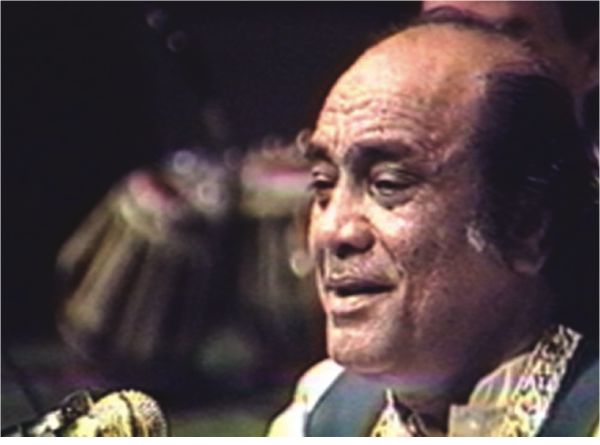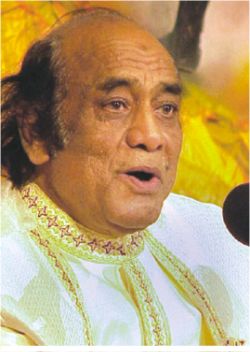Post Camps

Mehdi Hasan, Photos: Internet
A Ghazal for Mehdi Hasan
Asrar Chowdhury
| |
 |
| |
Runa Laila,
Photos: Internet |
My introduction to the magical world of Ghazals was at Cambridge at my friend Mazhar Sheikh's house -- a rare Pakistani who learned Bangla to appreciate the poetry and music of Tagore, Nazrul and other maestros from Bengal. Maz Bhai made a tempting offer one day: to hear one of the sweetest Ghazals in poetry, composition and rendition. It was the first Ghazal I heard. It was also the first time I properly listened to Mehdi Hasan as he sang the 1959 version of Faiz Ahmed Faiz's 'Gulon Mein Rang Bhaare,' a composition by Mehdi Hasan's elder brother Ghulam Qadir.
I am no performing musician, but I have tried to listen to music all my life with no reservation; listening to anything and everything. 'Gulon Mein Rang Bhare' is based on Raga Jhinjhoti (Khambaj Thaat)- characteristic
of many folk tunes from the deserts of Rajasthan. The passion in the voice with all the technical finesse of an artiste trained in dhrupad expresses the 'true subject of poetry' being 'the loss of the beloved' as Faiz himself once said to Naomi Lazard- the American poet and acclaimed transliterator of Faiz's poems into English. That first encounter with Mehdi Hasan made it clear. Life would never be the same again after having heard a bird sing.
The beauty of music lies in the universality of its alphabet. Whatever the names of the letters- Sa-Re-Ga; Do-Re-Mi; or A-B-C, and from wherever it originates- the West or the East- there can only be 12 notes in a scale (octave or saptak). This universality gives music the power to transcend cultural boundaries. The transition becomes complete when a composition is rendered by a technically sound musician who also has the power of passion to express the 'true subject' of all art- loss; deprivation; Diaspora making the voice smile, laugh, cry and love in the language of humanity. This is where Mehdi Hasan stands out making him a musician's musician; and any listener's Turkish Delight!
 |
|
Ghazals will not be the same.
Photos: Internet |
|
Ghazals originated from the ancient Arabic style of poetry in Qasidas. They bloomed in the 12th-14th centuries in the Persian language. Through the influence of maestros like Rumi, Saadi, Hafiz, Umar Khyyam and others, Ghazals slowly developed the form we see today. Under the Mughal Rule of Northern India, Ghazals established their presence in mainstream poetry and light classical music. It was in this tradition in 1927 that Mehdi Hasan was born in the village of Luna in Rajasthan of today's India into a family of musicians who were minstrels in the courts of Nawabs and Maharajahs for generations. After the partition of the sub-continent Mehdi Hasan and his family settled in today's Pakistan. The Diaspora of leaving his birthplace, the deserts of Rajasthan, forever left an imprint that was unique in all his renditions -- be that film music or Ghazals for which he was hailed as the undisputed King.
If you have the ears to listen, you will notice the subtle and fine transformation in the notes- the trademark of a seasoned artiste's years of practice. If you have the heart to listen- you will feel the Diaspora- the loss of a beloved that vibrates throughout Mehdi Hasan's music. It is this Diaspora in his voice that touches and tears the listener's heart and makes it bleed in the truest essence of Ghazals as poetry of love. Language is not a barrier to transcend cultural boundaries when a bird sings poetry. Any song from any language becomes the listener's Tambourine Man taking the listener on a 'magic swirling ship ... disappearing through the smoke rings of [the] mind'. It is this unique feature that has made Mehdi Hasan an influence, not only to listeners across languages in South Asia, but also to fellow musicians in South Asia. The Bangladesh Diva, Runa Laila, is indebted to Mehdi Hasan. Runa Laila is one of the few artistes who could make a Mehdi Hasan song Ahmed Faraz's Ghazal Ranjish Hi Sahi (based on Raga Yaman) her own signature song.
Mehdi Hasan was special. His training in classical music gave him the flexibility to transcend between commercial and connoisseur audiences. This is a rare ability in any artiste. The Diaspora in his voice made him shatter and melt even the coldest of hearts. He was one of the last in a line of Great Ghazal singers. Future generation Ghazal singers will appear tall because they will be standing on the shoulders of a Giant like him. When the most respected artiste of South Asia, Lata Mangeshkar, certifies that God resides in his voice, the world of music and Ghazals will never be the same again after June 13, 2012. Having said so, the 12 universal notes of the Maestro will vibrate for longer than one can tell. Nawazish Karam, Shukriya Meherbani, Mehdi Saab!
(The author teaches economic theory at Jahangirnagar University and North South University.)
| 